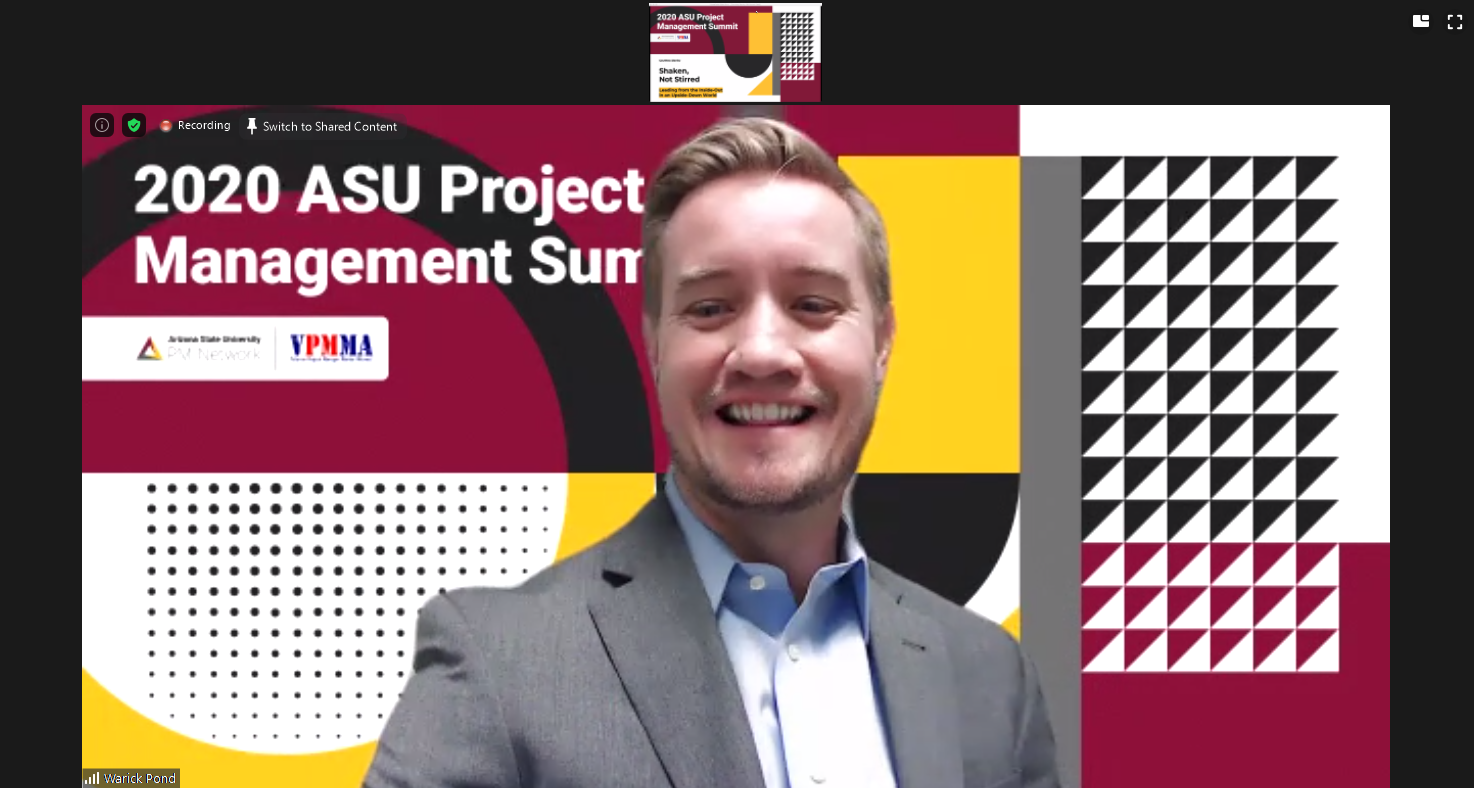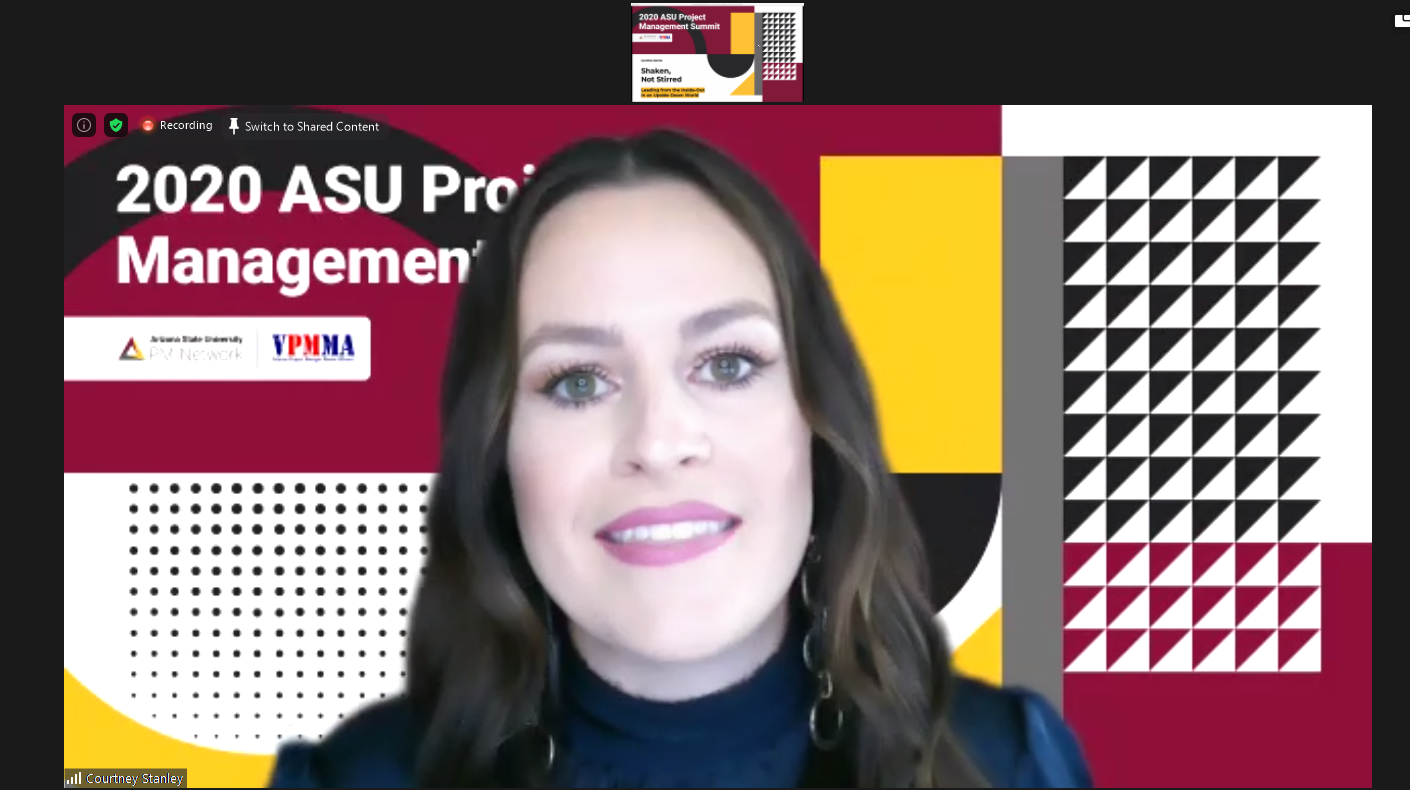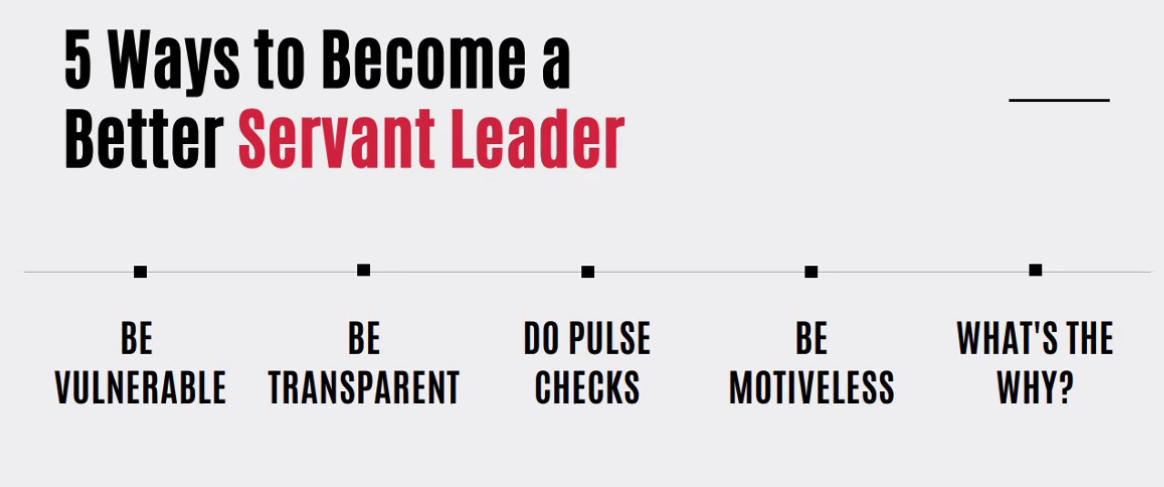PM Summit 2020 creates inclusive environment for project managers to collaborate

In a profession where planned projects fail 70% of the time, project management professionals of all experience levels need a place to have open and honest conversations about successes, learning opportunities and ways to grow.
On Thursday, Sept. 10, more than 130 attendees gathered virtually for the inaugural PM Summit to do just that. A collaboration between Arizona State University’s PM Network and the Veteran Project Manager Mentor Alliance (VPMMA), the PM Summit offered a safe place for everyone from students to industry experts to have real conversations and share thoughtful advice on how to be better project managers.
From an idea to a digital immersive event
“Where do project managers share the wins and losses, the success factors and theories, principles and practices that don't work?” said Warick Pond, executive director of the University Technology Office's Strategic Implementation Office. “We got excited at the idea of bringing project managers from nonprofit and for-profit organizations together to share amongst themselves.”
“We” in that conversation included Joe Pusz, co-founder of the VPMMA and founder and president of the PMO Squad, who was excited to pair with Warick and the ASU PM Network.
“The mission at VPMMA is to provide industry-based project management career mentorship and networking opportunities for our great nation’s service-members, veterans and military spouses,” Pusz said. “This aligns with the purpose for the PM Summit and was a great opportunity for us to contribute with speakers, staff and planning.”
Pond, Pusz and more than a dozen other project management professionals – including Jennifer Smolnik, former president elect of the ASU PM Network – gathered to create engaging event programming for a range of project managers.
“It was the first time ASU PM Network was able to engage with staff, students and the project management community outside of ASU for this kind of event,” Smolnik said. “We wanted attendees to come together from multiple levels of experience for real conversations about more than just concepts, being candid about what works and what doesn’t, how we can better lead projects and organizations and why caring about our people matters.”
Becoming better project managers ... together
Warwick Pond speaks during the PM Summit.
Pond began the morning’s events welcoming attendees to the first-ever PM Summit.
He then passed the spotlight to award-winning changemaker Courtney Stanley, who delivered her session, "Shaken, Not Stirred: Leading from the Inside-Out in an Upside-Down World."
Stanley offered the PM Summit community many thought-provoking questions during her keynote, asking them to think about the things that inspire them.
Because in these challenging times, Stanley said, “you have control over what inspires you.”
PM Summit keynote speaker Courtney Stanley.
She spoke to the PM Summit attendees about topics like the five stages of grief, and in order to lead others, you need to care for yourself first. “You can’t pour from an empty cup,” Stanley said. “Supporting yourself is the first step to supporting others.”
How?
1. Make the first move: Set goals! Dream big, think small. What brings you joy?
2. Take another step: Track it. Create awareness of progress. How are you spending your time?
3. The final move: Be transparent. Let others cheer you on. Lean on your people. Love your people.
Stanley also touched on five habits of highly empathetic people (be curious, challenge prejudice, find commonality, listen hard and open up), four tools to increase emotional intelligence and five ways to become a better servant leader — a theme that was also popular in several breakout sessions.
“This crisis doesn’t have to be about the setback,” Stanley said. “Make it about the comeback.”
After Stanley's talk, attendees were invited to two back-to-back breakout sessions, with topics that included: navigating organizational change, finding your value proposition, process streamlining, increasing inclusivity in the field of project management, change leadership, employee empowerment and more.
Pusz, who presented “Empowering People to Deliver Results,” explained that events like the PM Summit and organizations such as VPMMA provide an opportunity for project management professionals with experience to share and those just starting out to learn.
“’A rising tide lifts all boats’ is a saying I love — we don’t need to compete, rather we should work together for the benefit of all,” Pusz said. “I feel strongly that service and giving back are necessary and help to advance any community. Project managers face so much pressure to produce, and they should have a community to lean on when times are tough.”
In the end, the event organizers felt the PM Summit achieved their goals of creating a place to help project management professionals at all experience levels.
“We have much to offer in terms of mentoring and coaching to give back within the community of project professionals,” Pond said. “We have an obligation to do just that to ensure the next generation of project managers are successful.”
More Science and technology

What does a spacecraft, a skeleton and an asteroid have in common? This ASU professor
NASA’s Lucy spacecraft will probe an asteroid as it flys by it on Sunday — one with a connection to the mission name.The asteroid…

Hack like you 'meme' it
What do pepperoni pizza, cat memes and an online dojo have in common?It turns out, these are all essential elements of a great…

ASU professor breeds new tomato variety, the 'Desert Dew'
In an era defined by climate volatility and resource scarcity, researchers are developing crops that can survive — and thrive —…




